Introduction to Management
VerifiedAdded on 2023/01/18
|9
|2595
|74
AI Summary
This document provides an introduction to management and its significance in organizations. It discusses the issues faced by Imperial Hotel and offers potential solutions. The document also explores management theory and its application in the case study.
Contribute Materials
Your contribution can guide someone’s learning journey. Share your
documents today.
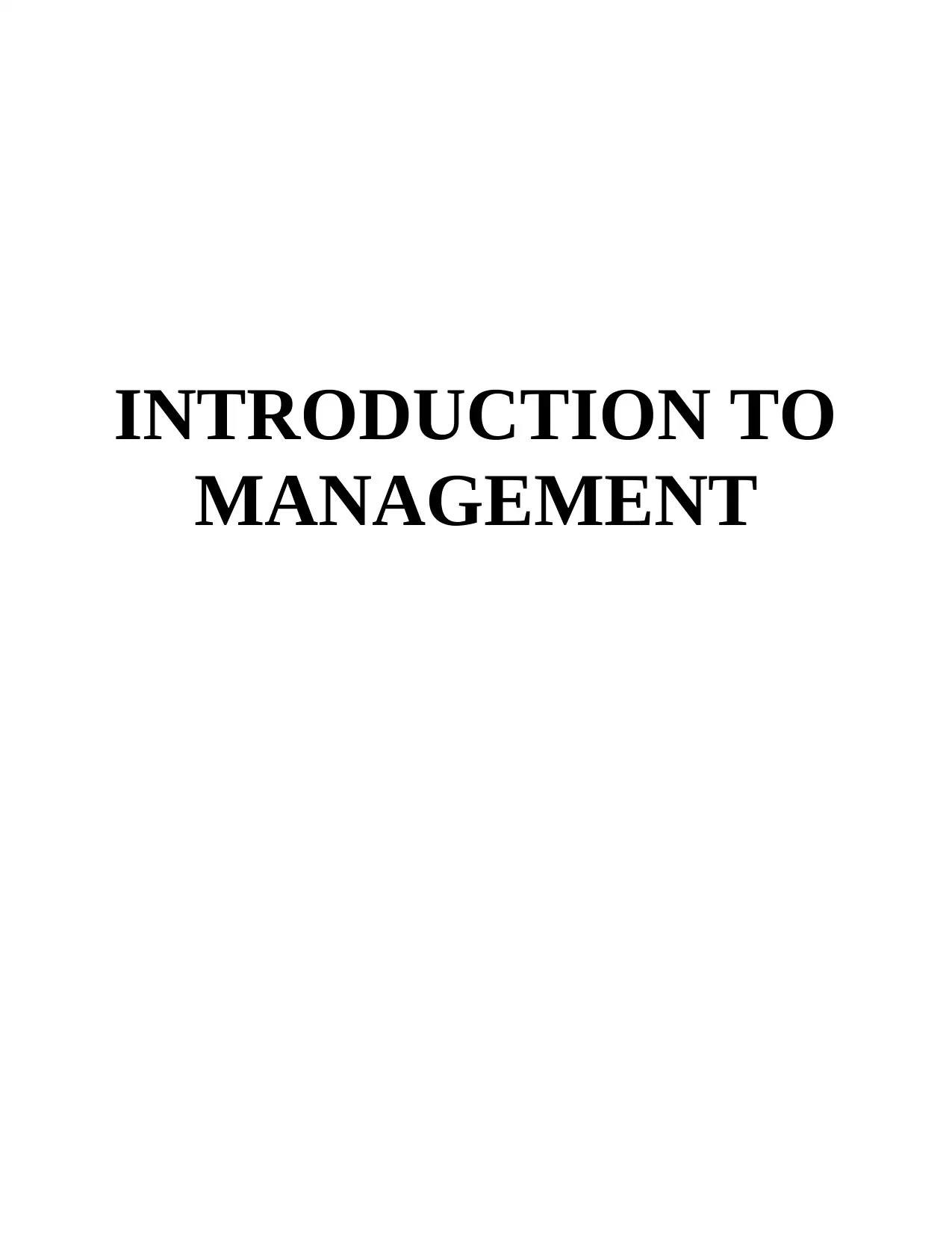
INTRODUCTION TO
MANAGEMENT
MANAGEMENT
Secure Best Marks with AI Grader
Need help grading? Try our AI Grader for instant feedback on your assignments.
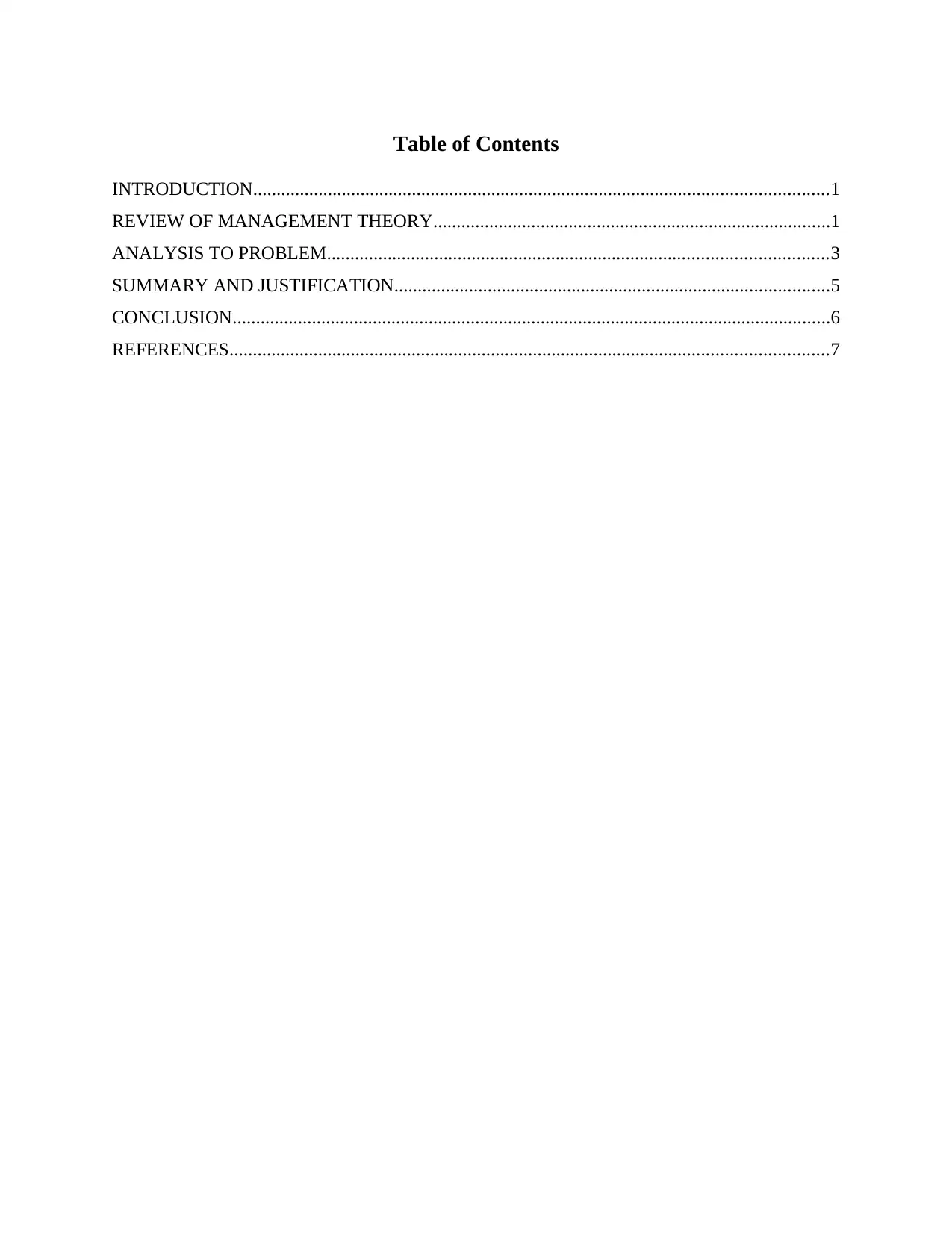
Table of Contents
INTRODUCTION...........................................................................................................................1
REVIEW OF MANAGEMENT THEORY.....................................................................................1
ANALYSIS TO PROBLEM...........................................................................................................3
SUMMARY AND JUSTIFICATION.............................................................................................5
CONCLUSION................................................................................................................................6
REFERENCES................................................................................................................................7
INTRODUCTION...........................................................................................................................1
REVIEW OF MANAGEMENT THEORY.....................................................................................1
ANALYSIS TO PROBLEM...........................................................................................................3
SUMMARY AND JUSTIFICATION.............................................................................................5
CONCLUSION................................................................................................................................6
REFERENCES................................................................................................................................7
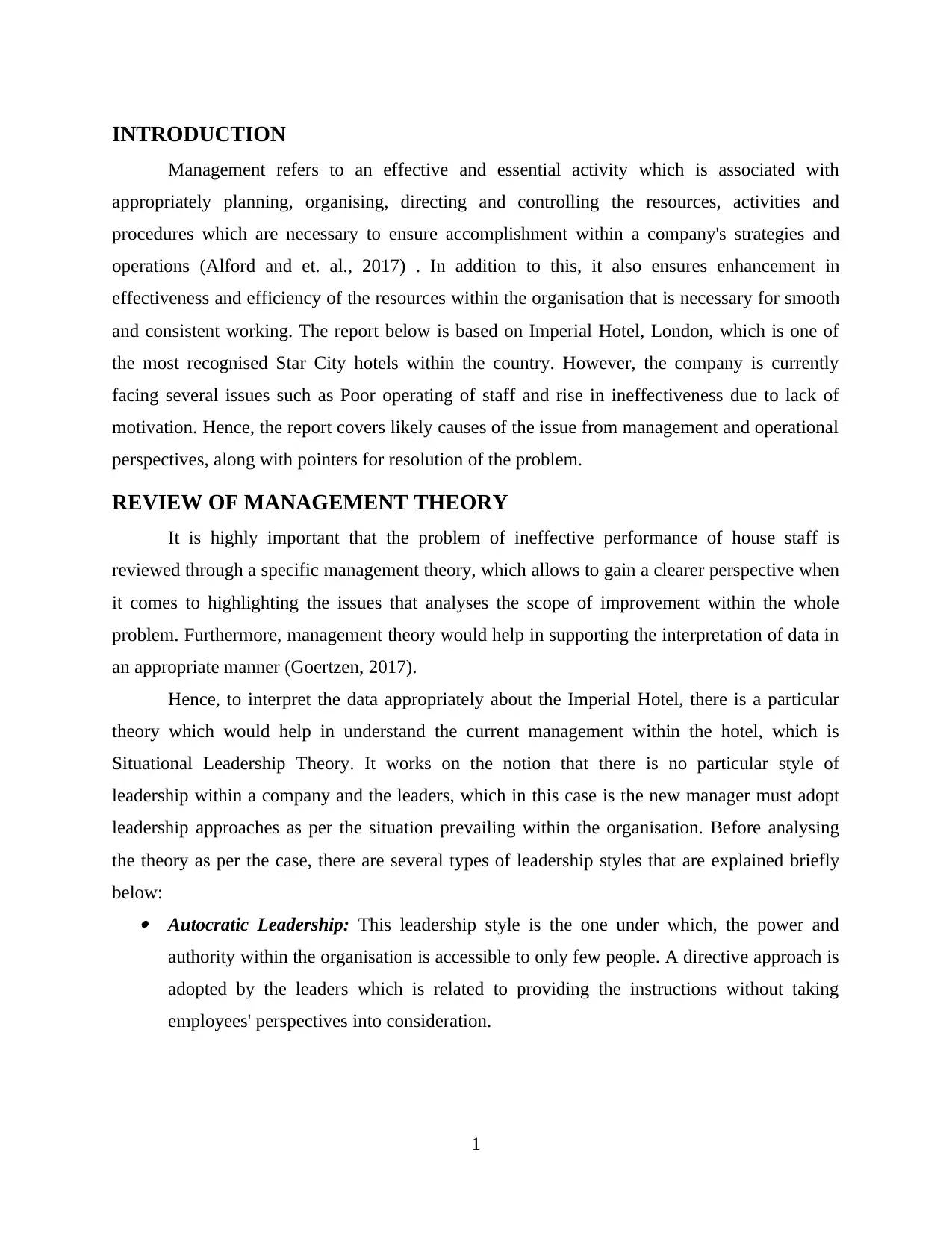
INTRODUCTION
Management refers to an effective and essential activity which is associated with
appropriately planning, organising, directing and controlling the resources, activities and
procedures which are necessary to ensure accomplishment within a company's strategies and
operations (Alford and et. al., 2017) . In addition to this, it also ensures enhancement in
effectiveness and efficiency of the resources within the organisation that is necessary for smooth
and consistent working. The report below is based on Imperial Hotel, London, which is one of
the most recognised Star City hotels within the country. However, the company is currently
facing several issues such as Poor operating of staff and rise in ineffectiveness due to lack of
motivation. Hence, the report covers likely causes of the issue from management and operational
perspectives, along with pointers for resolution of the problem.
REVIEW OF MANAGEMENT THEORY
It is highly important that the problem of ineffective performance of house staff is
reviewed through a specific management theory, which allows to gain a clearer perspective when
it comes to highlighting the issues that analyses the scope of improvement within the whole
problem. Furthermore, management theory would help in supporting the interpretation of data in
an appropriate manner (Goertzen, 2017).
Hence, to interpret the data appropriately about the Imperial Hotel, there is a particular
theory which would help in understand the current management within the hotel, which is
Situational Leadership Theory. It works on the notion that there is no particular style of
leadership within a company and the leaders, which in this case is the new manager must adopt
leadership approaches as per the situation prevailing within the organisation. Before analysing
the theory as per the case, there are several types of leadership styles that are explained briefly
below: Autocratic Leadership: This leadership style is the one under which, the power and
authority within the organisation is accessible to only few people. A directive approach is
adopted by the leaders which is related to providing the instructions without taking
employees' perspectives into consideration.
1
Management refers to an effective and essential activity which is associated with
appropriately planning, organising, directing and controlling the resources, activities and
procedures which are necessary to ensure accomplishment within a company's strategies and
operations (Alford and et. al., 2017) . In addition to this, it also ensures enhancement in
effectiveness and efficiency of the resources within the organisation that is necessary for smooth
and consistent working. The report below is based on Imperial Hotel, London, which is one of
the most recognised Star City hotels within the country. However, the company is currently
facing several issues such as Poor operating of staff and rise in ineffectiveness due to lack of
motivation. Hence, the report covers likely causes of the issue from management and operational
perspectives, along with pointers for resolution of the problem.
REVIEW OF MANAGEMENT THEORY
It is highly important that the problem of ineffective performance of house staff is
reviewed through a specific management theory, which allows to gain a clearer perspective when
it comes to highlighting the issues that analyses the scope of improvement within the whole
problem. Furthermore, management theory would help in supporting the interpretation of data in
an appropriate manner (Goertzen, 2017).
Hence, to interpret the data appropriately about the Imperial Hotel, there is a particular
theory which would help in understand the current management within the hotel, which is
Situational Leadership Theory. It works on the notion that there is no particular style of
leadership within a company and the leaders, which in this case is the new manager must adopt
leadership approaches as per the situation prevailing within the organisation. Before analysing
the theory as per the case, there are several types of leadership styles that are explained briefly
below: Autocratic Leadership: This leadership style is the one under which, the power and
authority within the organisation is accessible to only few people. A directive approach is
adopted by the leaders which is related to providing the instructions without taking
employees' perspectives into consideration.
1
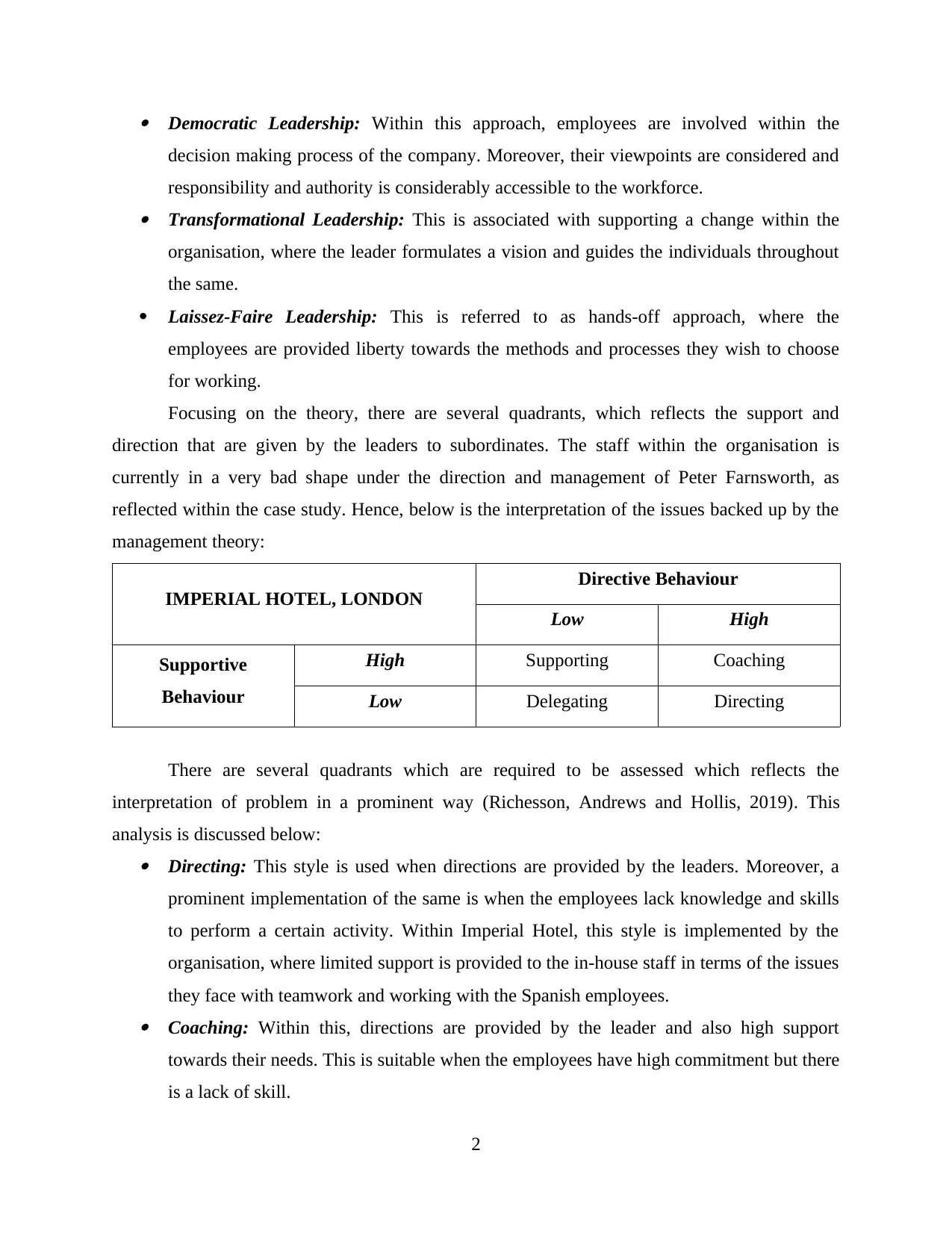
Democratic Leadership: Within this approach, employees are involved within the
decision making process of the company. Moreover, their viewpoints are considered and
responsibility and authority is considerably accessible to the workforce. Transformational Leadership: This is associated with supporting a change within the
organisation, where the leader formulates a vision and guides the individuals throughout
the same.
Laissez-Faire Leadership: This is referred to as hands-off approach, where the
employees are provided liberty towards the methods and processes they wish to choose
for working.
Focusing on the theory, there are several quadrants, which reflects the support and
direction that are given by the leaders to subordinates. The staff within the organisation is
currently in a very bad shape under the direction and management of Peter Farnsworth, as
reflected within the case study. Hence, below is the interpretation of the issues backed up by the
management theory:
IMPERIAL HOTEL, LONDON
Directive Behaviour
Low High
Supportive
Behaviour
High Supporting Coaching
Low Delegating Directing
There are several quadrants which are required to be assessed which reflects the
interpretation of problem in a prominent way (Richesson, Andrews and Hollis, 2019). This
analysis is discussed below: Directing: This style is used when directions are provided by the leaders. Moreover, a
prominent implementation of the same is when the employees lack knowledge and skills
to perform a certain activity. Within Imperial Hotel, this style is implemented by the
organisation, where limited support is provided to the in-house staff in terms of the issues
they face with teamwork and working with the Spanish employees. Coaching: Within this, directions are provided by the leader and also high support
towards their needs. This is suitable when the employees have high commitment but there
is a lack of skill.
2
decision making process of the company. Moreover, their viewpoints are considered and
responsibility and authority is considerably accessible to the workforce. Transformational Leadership: This is associated with supporting a change within the
organisation, where the leader formulates a vision and guides the individuals throughout
the same.
Laissez-Faire Leadership: This is referred to as hands-off approach, where the
employees are provided liberty towards the methods and processes they wish to choose
for working.
Focusing on the theory, there are several quadrants, which reflects the support and
direction that are given by the leaders to subordinates. The staff within the organisation is
currently in a very bad shape under the direction and management of Peter Farnsworth, as
reflected within the case study. Hence, below is the interpretation of the issues backed up by the
management theory:
IMPERIAL HOTEL, LONDON
Directive Behaviour
Low High
Supportive
Behaviour
High Supporting Coaching
Low Delegating Directing
There are several quadrants which are required to be assessed which reflects the
interpretation of problem in a prominent way (Richesson, Andrews and Hollis, 2019). This
analysis is discussed below: Directing: This style is used when directions are provided by the leaders. Moreover, a
prominent implementation of the same is when the employees lack knowledge and skills
to perform a certain activity. Within Imperial Hotel, this style is implemented by the
organisation, where limited support is provided to the in-house staff in terms of the issues
they face with teamwork and working with the Spanish employees. Coaching: Within this, directions are provided by the leader and also high support
towards their needs. This is suitable when the employees have high commitment but there
is a lack of skill.
2
Secure Best Marks with AI Grader
Need help grading? Try our AI Grader for instant feedback on your assignments.
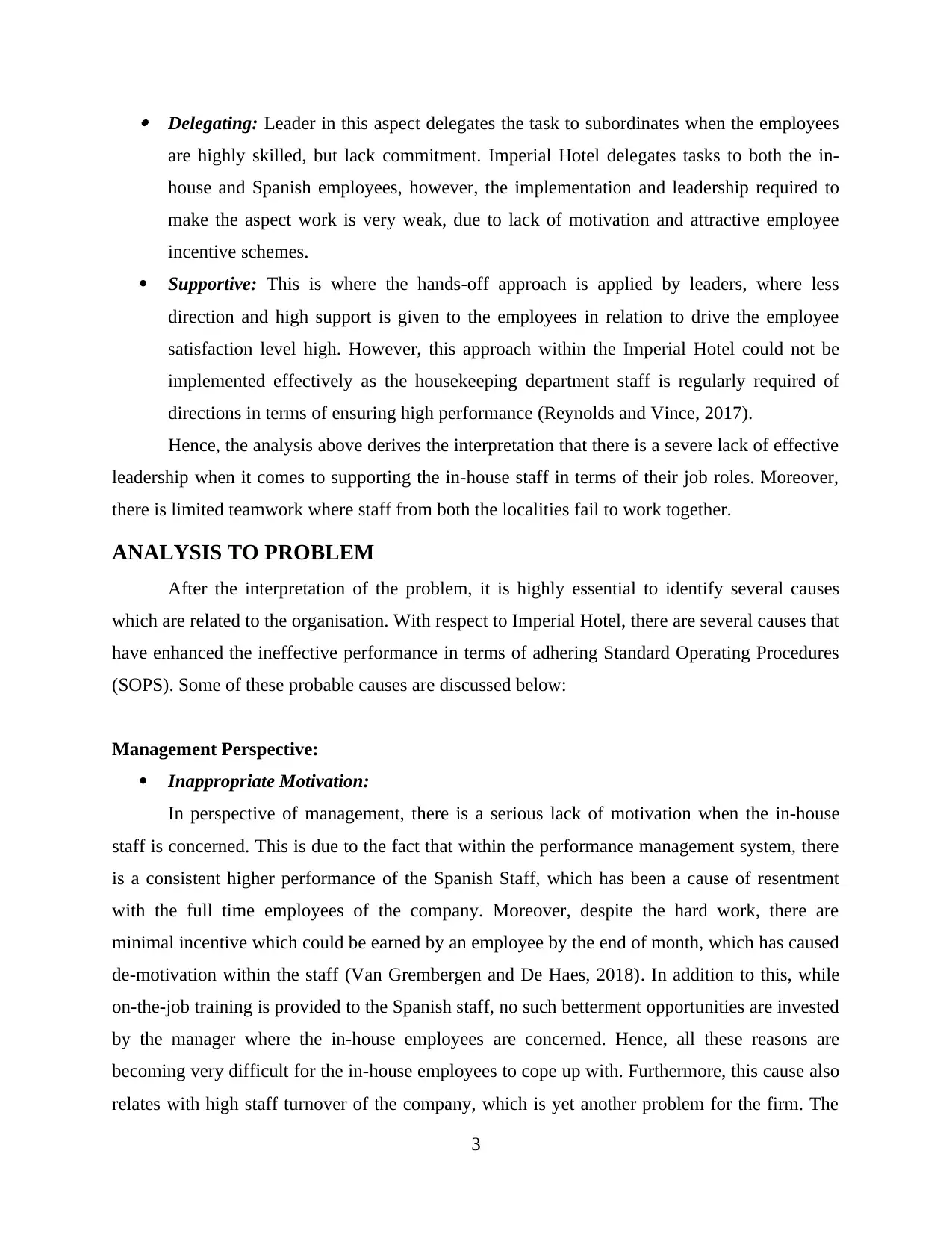
Delegating: Leader in this aspect delegates the task to subordinates when the employees
are highly skilled, but lack commitment. Imperial Hotel delegates tasks to both the in-
house and Spanish employees, however, the implementation and leadership required to
make the aspect work is very weak, due to lack of motivation and attractive employee
incentive schemes.
Supportive: This is where the hands-off approach is applied by leaders, where less
direction and high support is given to the employees in relation to drive the employee
satisfaction level high. However, this approach within the Imperial Hotel could not be
implemented effectively as the housekeeping department staff is regularly required of
directions in terms of ensuring high performance (Reynolds and Vince, 2017).
Hence, the analysis above derives the interpretation that there is a severe lack of effective
leadership when it comes to supporting the in-house staff in terms of their job roles. Moreover,
there is limited teamwork where staff from both the localities fail to work together.
ANALYSIS TO PROBLEM
After the interpretation of the problem, it is highly essential to identify several causes
which are related to the organisation. With respect to Imperial Hotel, there are several causes that
have enhanced the ineffective performance in terms of adhering Standard Operating Procedures
(SOPS). Some of these probable causes are discussed below:
Management Perspective:
Inappropriate Motivation:
In perspective of management, there is a serious lack of motivation when the in-house
staff is concerned. This is due to the fact that within the performance management system, there
is a consistent higher performance of the Spanish Staff, which has been a cause of resentment
with the full time employees of the company. Moreover, despite the hard work, there are
minimal incentive which could be earned by an employee by the end of month, which has caused
de-motivation within the staff (Van Grembergen and De Haes, 2018). In addition to this, while
on-the-job training is provided to the Spanish staff, no such betterment opportunities are invested
by the manager where the in-house employees are concerned. Hence, all these reasons are
becoming very difficult for the in-house employees to cope up with. Furthermore, this cause also
relates with high staff turnover of the company, which is yet another problem for the firm. The
3
are highly skilled, but lack commitment. Imperial Hotel delegates tasks to both the in-
house and Spanish employees, however, the implementation and leadership required to
make the aspect work is very weak, due to lack of motivation and attractive employee
incentive schemes.
Supportive: This is where the hands-off approach is applied by leaders, where less
direction and high support is given to the employees in relation to drive the employee
satisfaction level high. However, this approach within the Imperial Hotel could not be
implemented effectively as the housekeeping department staff is regularly required of
directions in terms of ensuring high performance (Reynolds and Vince, 2017).
Hence, the analysis above derives the interpretation that there is a severe lack of effective
leadership when it comes to supporting the in-house staff in terms of their job roles. Moreover,
there is limited teamwork where staff from both the localities fail to work together.
ANALYSIS TO PROBLEM
After the interpretation of the problem, it is highly essential to identify several causes
which are related to the organisation. With respect to Imperial Hotel, there are several causes that
have enhanced the ineffective performance in terms of adhering Standard Operating Procedures
(SOPS). Some of these probable causes are discussed below:
Management Perspective:
Inappropriate Motivation:
In perspective of management, there is a serious lack of motivation when the in-house
staff is concerned. This is due to the fact that within the performance management system, there
is a consistent higher performance of the Spanish Staff, which has been a cause of resentment
with the full time employees of the company. Moreover, despite the hard work, there are
minimal incentive which could be earned by an employee by the end of month, which has caused
de-motivation within the staff (Van Grembergen and De Haes, 2018). In addition to this, while
on-the-job training is provided to the Spanish staff, no such betterment opportunities are invested
by the manager where the in-house employees are concerned. Hence, all these reasons are
becoming very difficult for the in-house employees to cope up with. Furthermore, this cause also
relates with high staff turnover of the company, which is yet another problem for the firm. The
3
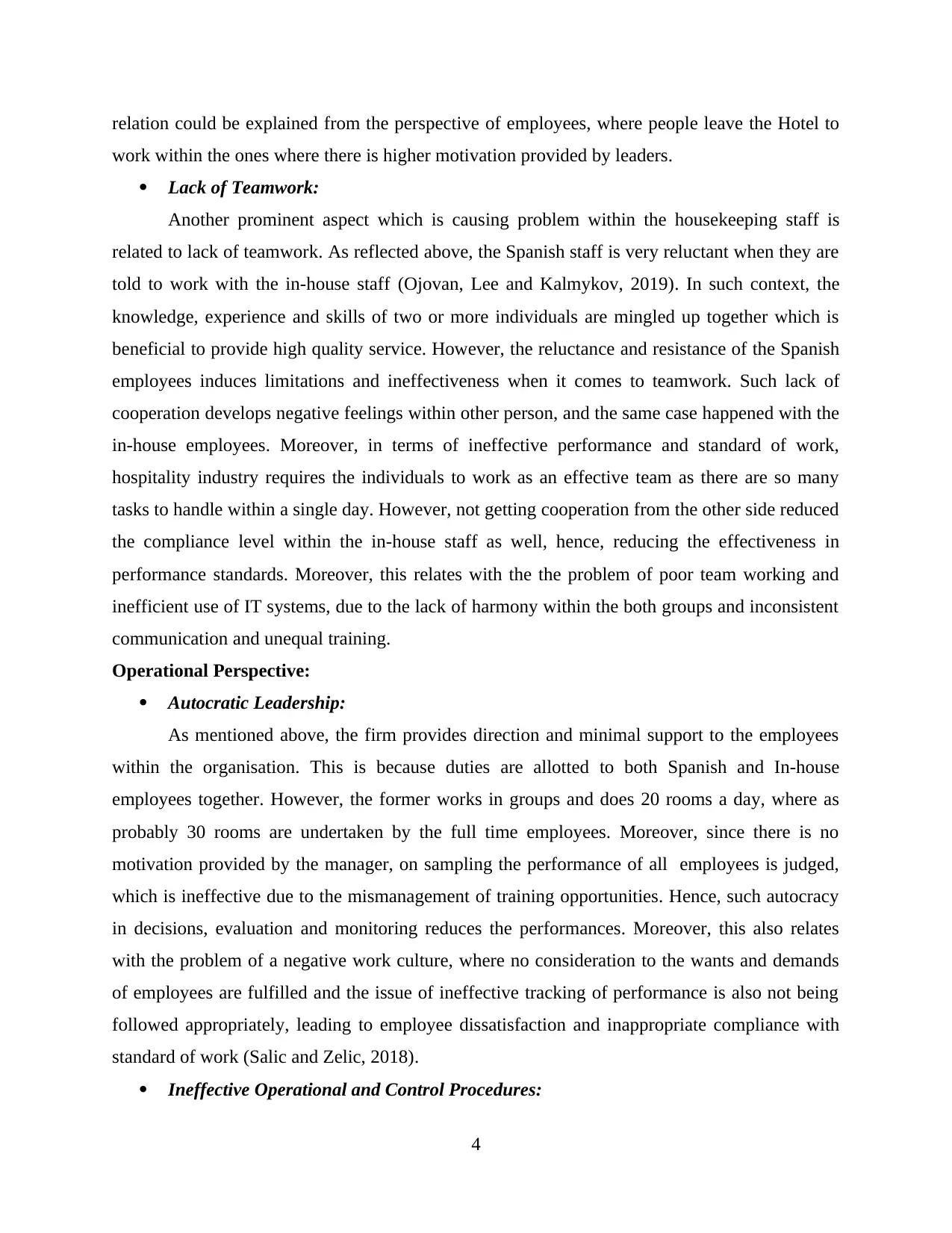
relation could be explained from the perspective of employees, where people leave the Hotel to
work within the ones where there is higher motivation provided by leaders.
Lack of Teamwork:
Another prominent aspect which is causing problem within the housekeeping staff is
related to lack of teamwork. As reflected above, the Spanish staff is very reluctant when they are
told to work with the in-house staff (Ojovan, Lee and Kalmykov, 2019). In such context, the
knowledge, experience and skills of two or more individuals are mingled up together which is
beneficial to provide high quality service. However, the reluctance and resistance of the Spanish
employees induces limitations and ineffectiveness when it comes to teamwork. Such lack of
cooperation develops negative feelings within other person, and the same case happened with the
in-house employees. Moreover, in terms of ineffective performance and standard of work,
hospitality industry requires the individuals to work as an effective team as there are so many
tasks to handle within a single day. However, not getting cooperation from the other side reduced
the compliance level within the in-house staff as well, hence, reducing the effectiveness in
performance standards. Moreover, this relates with the the problem of poor team working and
inefficient use of IT systems, due to the lack of harmony within the both groups and inconsistent
communication and unequal training.
Operational Perspective:
Autocratic Leadership:
As mentioned above, the firm provides direction and minimal support to the employees
within the organisation. This is because duties are allotted to both Spanish and In-house
employees together. However, the former works in groups and does 20 rooms a day, where as
probably 30 rooms are undertaken by the full time employees. Moreover, since there is no
motivation provided by the manager, on sampling the performance of all employees is judged,
which is ineffective due to the mismanagement of training opportunities. Hence, such autocracy
in decisions, evaluation and monitoring reduces the performances. Moreover, this also relates
with the problem of a negative work culture, where no consideration to the wants and demands
of employees are fulfilled and the issue of ineffective tracking of performance is also not being
followed appropriately, leading to employee dissatisfaction and inappropriate compliance with
standard of work (Salic and Zelic, 2018).
Ineffective Operational and Control Procedures:
4
work within the ones where there is higher motivation provided by leaders.
Lack of Teamwork:
Another prominent aspect which is causing problem within the housekeeping staff is
related to lack of teamwork. As reflected above, the Spanish staff is very reluctant when they are
told to work with the in-house staff (Ojovan, Lee and Kalmykov, 2019). In such context, the
knowledge, experience and skills of two or more individuals are mingled up together which is
beneficial to provide high quality service. However, the reluctance and resistance of the Spanish
employees induces limitations and ineffectiveness when it comes to teamwork. Such lack of
cooperation develops negative feelings within other person, and the same case happened with the
in-house employees. Moreover, in terms of ineffective performance and standard of work,
hospitality industry requires the individuals to work as an effective team as there are so many
tasks to handle within a single day. However, not getting cooperation from the other side reduced
the compliance level within the in-house staff as well, hence, reducing the effectiveness in
performance standards. Moreover, this relates with the the problem of poor team working and
inefficient use of IT systems, due to the lack of harmony within the both groups and inconsistent
communication and unequal training.
Operational Perspective:
Autocratic Leadership:
As mentioned above, the firm provides direction and minimal support to the employees
within the organisation. This is because duties are allotted to both Spanish and In-house
employees together. However, the former works in groups and does 20 rooms a day, where as
probably 30 rooms are undertaken by the full time employees. Moreover, since there is no
motivation provided by the manager, on sampling the performance of all employees is judged,
which is ineffective due to the mismanagement of training opportunities. Hence, such autocracy
in decisions, evaluation and monitoring reduces the performances. Moreover, this also relates
with the problem of a negative work culture, where no consideration to the wants and demands
of employees are fulfilled and the issue of ineffective tracking of performance is also not being
followed appropriately, leading to employee dissatisfaction and inappropriate compliance with
standard of work (Salic and Zelic, 2018).
Ineffective Operational and Control Procedures:
4
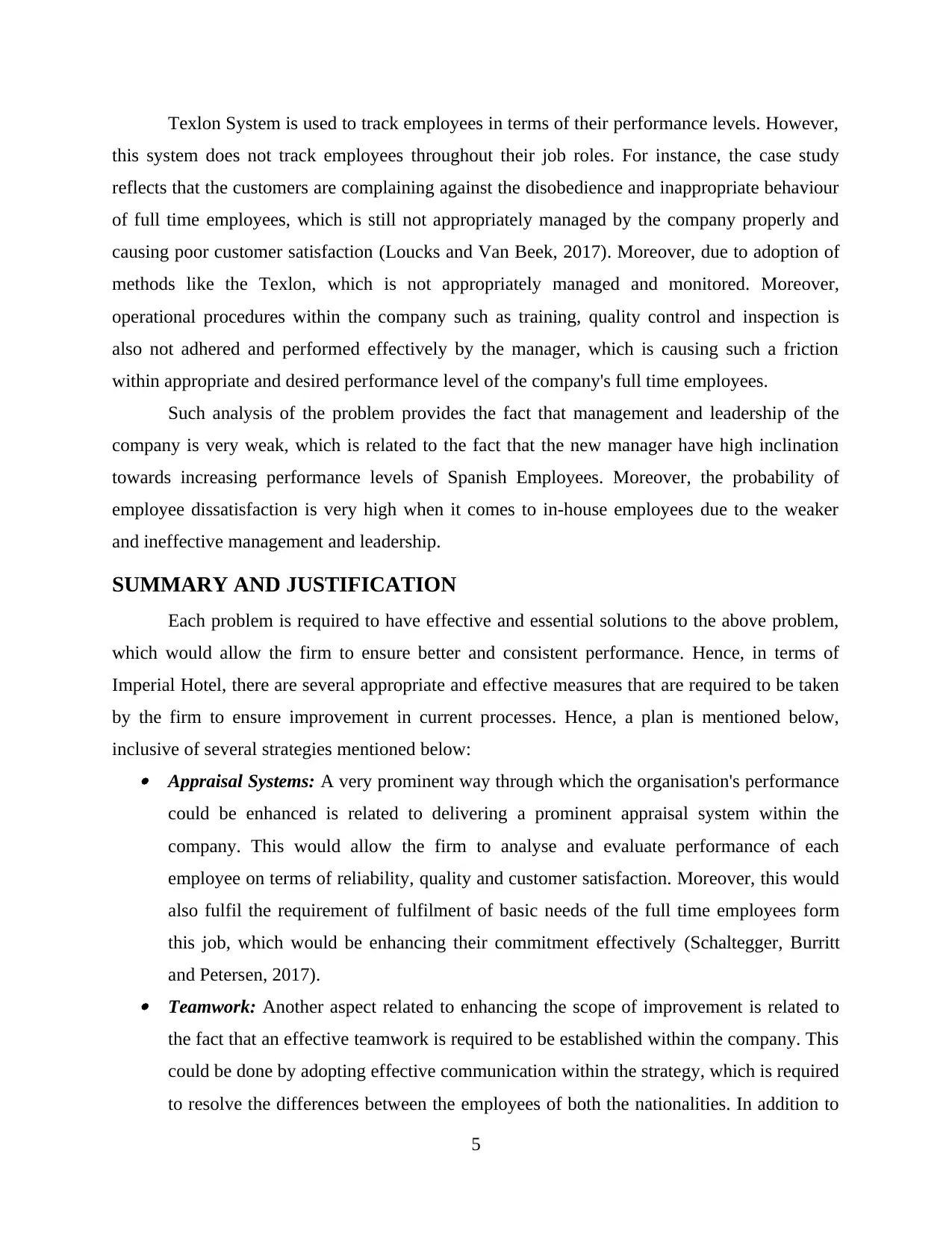
Texlon System is used to track employees in terms of their performance levels. However,
this system does not track employees throughout their job roles. For instance, the case study
reflects that the customers are complaining against the disobedience and inappropriate behaviour
of full time employees, which is still not appropriately managed by the company properly and
causing poor customer satisfaction (Loucks and Van Beek, 2017). Moreover, due to adoption of
methods like the Texlon, which is not appropriately managed and monitored. Moreover,
operational procedures within the company such as training, quality control and inspection is
also not adhered and performed effectively by the manager, which is causing such a friction
within appropriate and desired performance level of the company's full time employees.
Such analysis of the problem provides the fact that management and leadership of the
company is very weak, which is related to the fact that the new manager have high inclination
towards increasing performance levels of Spanish Employees. Moreover, the probability of
employee dissatisfaction is very high when it comes to in-house employees due to the weaker
and ineffective management and leadership.
SUMMARY AND JUSTIFICATION
Each problem is required to have effective and essential solutions to the above problem,
which would allow the firm to ensure better and consistent performance. Hence, in terms of
Imperial Hotel, there are several appropriate and effective measures that are required to be taken
by the firm to ensure improvement in current processes. Hence, a plan is mentioned below,
inclusive of several strategies mentioned below: Appraisal Systems: A very prominent way through which the organisation's performance
could be enhanced is related to delivering a prominent appraisal system within the
company. This would allow the firm to analyse and evaluate performance of each
employee on terms of reliability, quality and customer satisfaction. Moreover, this would
also fulfil the requirement of fulfilment of basic needs of the full time employees form
this job, which would be enhancing their commitment effectively (Schaltegger, Burritt
and Petersen, 2017). Teamwork: Another aspect related to enhancing the scope of improvement is related to
the fact that an effective teamwork is required to be established within the company. This
could be done by adopting effective communication within the strategy, which is required
to resolve the differences between the employees of both the nationalities. In addition to
5
this system does not track employees throughout their job roles. For instance, the case study
reflects that the customers are complaining against the disobedience and inappropriate behaviour
of full time employees, which is still not appropriately managed by the company properly and
causing poor customer satisfaction (Loucks and Van Beek, 2017). Moreover, due to adoption of
methods like the Texlon, which is not appropriately managed and monitored. Moreover,
operational procedures within the company such as training, quality control and inspection is
also not adhered and performed effectively by the manager, which is causing such a friction
within appropriate and desired performance level of the company's full time employees.
Such analysis of the problem provides the fact that management and leadership of the
company is very weak, which is related to the fact that the new manager have high inclination
towards increasing performance levels of Spanish Employees. Moreover, the probability of
employee dissatisfaction is very high when it comes to in-house employees due to the weaker
and ineffective management and leadership.
SUMMARY AND JUSTIFICATION
Each problem is required to have effective and essential solutions to the above problem,
which would allow the firm to ensure better and consistent performance. Hence, in terms of
Imperial Hotel, there are several appropriate and effective measures that are required to be taken
by the firm to ensure improvement in current processes. Hence, a plan is mentioned below,
inclusive of several strategies mentioned below: Appraisal Systems: A very prominent way through which the organisation's performance
could be enhanced is related to delivering a prominent appraisal system within the
company. This would allow the firm to analyse and evaluate performance of each
employee on terms of reliability, quality and customer satisfaction. Moreover, this would
also fulfil the requirement of fulfilment of basic needs of the full time employees form
this job, which would be enhancing their commitment effectively (Schaltegger, Burritt
and Petersen, 2017). Teamwork: Another aspect related to enhancing the scope of improvement is related to
the fact that an effective teamwork is required to be established within the company. This
could be done by adopting effective communication within the strategy, which is required
to resolve the differences between the employees of both the nationalities. In addition to
5
Paraphrase This Document
Need a fresh take? Get an instant paraphrase of this document with our AI Paraphraser
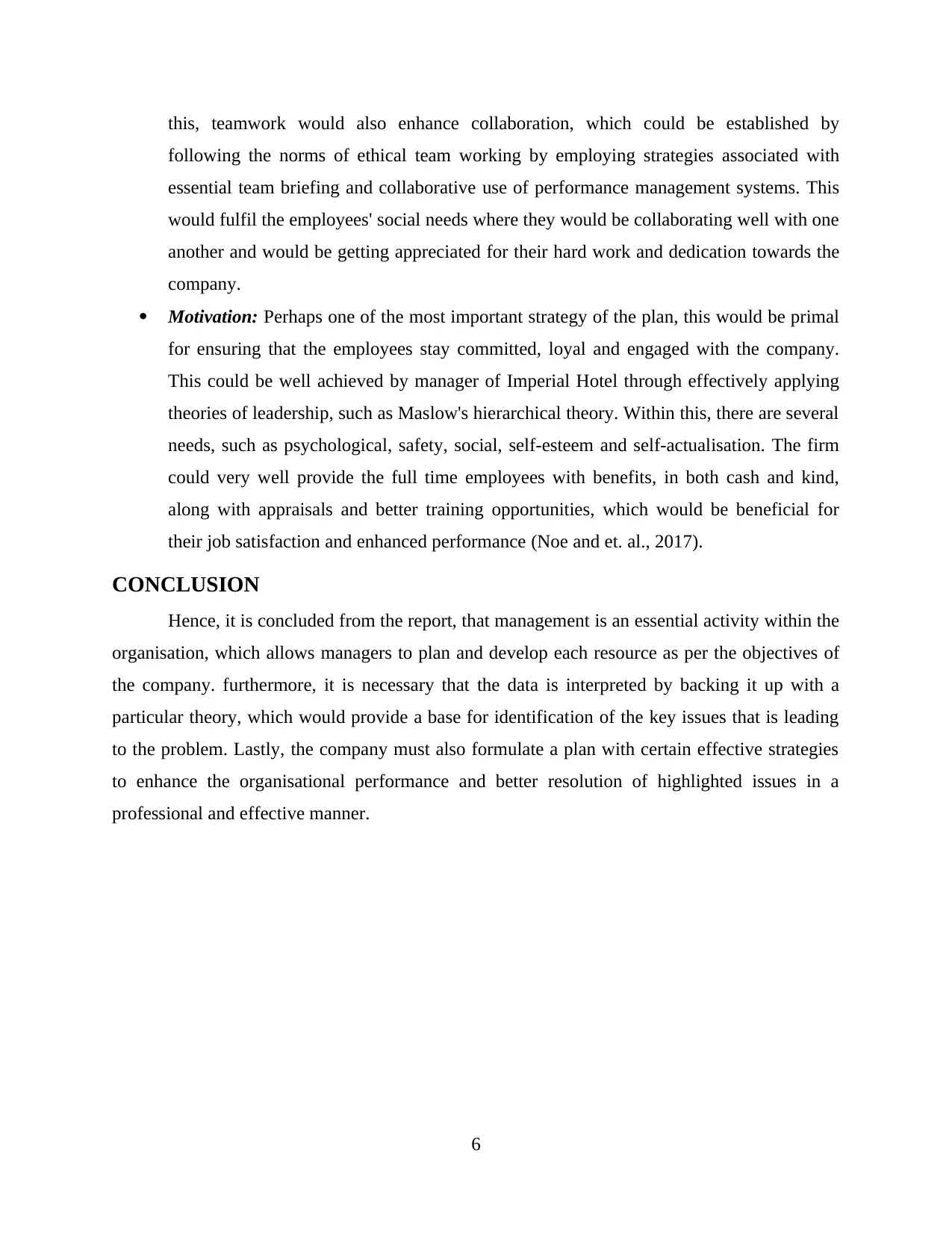
this, teamwork would also enhance collaboration, which could be established by
following the norms of ethical team working by employing strategies associated with
essential team briefing and collaborative use of performance management systems. This
would fulfil the employees' social needs where they would be collaborating well with one
another and would be getting appreciated for their hard work and dedication towards the
company.
Motivation: Perhaps one of the most important strategy of the plan, this would be primal
for ensuring that the employees stay committed, loyal and engaged with the company.
This could be well achieved by manager of Imperial Hotel through effectively applying
theories of leadership, such as Maslow's hierarchical theory. Within this, there are several
needs, such as psychological, safety, social, self-esteem and self-actualisation. The firm
could very well provide the full time employees with benefits, in both cash and kind,
along with appraisals and better training opportunities, which would be beneficial for
their job satisfaction and enhanced performance (Noe and et. al., 2017).
CONCLUSION
Hence, it is concluded from the report, that management is an essential activity within the
organisation, which allows managers to plan and develop each resource as per the objectives of
the company. furthermore, it is necessary that the data is interpreted by backing it up with a
particular theory, which would provide a base for identification of the key issues that is leading
to the problem. Lastly, the company must also formulate a plan with certain effective strategies
to enhance the organisational performance and better resolution of highlighted issues in a
professional and effective manner.
6
following the norms of ethical team working by employing strategies associated with
essential team briefing and collaborative use of performance management systems. This
would fulfil the employees' social needs where they would be collaborating well with one
another and would be getting appreciated for their hard work and dedication towards the
company.
Motivation: Perhaps one of the most important strategy of the plan, this would be primal
for ensuring that the employees stay committed, loyal and engaged with the company.
This could be well achieved by manager of Imperial Hotel through effectively applying
theories of leadership, such as Maslow's hierarchical theory. Within this, there are several
needs, such as psychological, safety, social, self-esteem and self-actualisation. The firm
could very well provide the full time employees with benefits, in both cash and kind,
along with appraisals and better training opportunities, which would be beneficial for
their job satisfaction and enhanced performance (Noe and et. al., 2017).
CONCLUSION
Hence, it is concluded from the report, that management is an essential activity within the
organisation, which allows managers to plan and develop each resource as per the objectives of
the company. furthermore, it is necessary that the data is interpreted by backing it up with a
particular theory, which would provide a base for identification of the key issues that is leading
to the problem. Lastly, the company must also formulate a plan with certain effective strategies
to enhance the organisational performance and better resolution of highlighted issues in a
professional and effective manner.
6
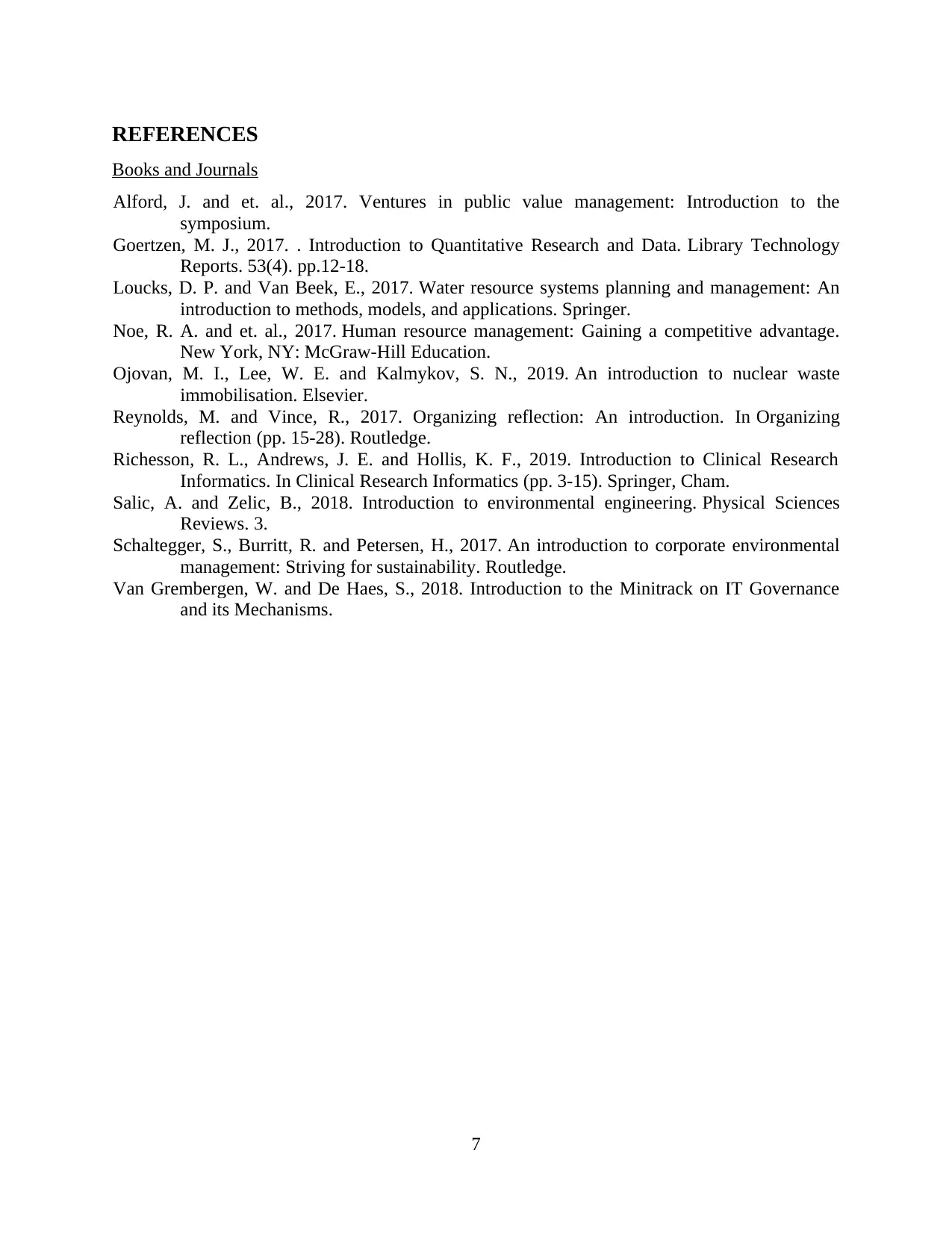
REFERENCES
Books and Journals
Alford, J. and et. al., 2017. Ventures in public value management: Introduction to the
symposium.
Goertzen, M. J., 2017. . Introduction to Quantitative Research and Data. Library Technology
Reports. 53(4). pp.12-18.
Loucks, D. P. and Van Beek, E., 2017. Water resource systems planning and management: An
introduction to methods, models, and applications. Springer.
Noe, R. A. and et. al., 2017. Human resource management: Gaining a competitive advantage.
New York, NY: McGraw-Hill Education.
Ojovan, M. I., Lee, W. E. and Kalmykov, S. N., 2019. An introduction to nuclear waste
immobilisation. Elsevier.
Reynolds, M. and Vince, R., 2017. Organizing reflection: An introduction. In Organizing
reflection (pp. 15-28). Routledge.
Richesson, R. L., Andrews, J. E. and Hollis, K. F., 2019. Introduction to Clinical Research
Informatics. In Clinical Research Informatics (pp. 3-15). Springer, Cham.
Salic, A. and Zelic, B., 2018. Introduction to environmental engineering. Physical Sciences
Reviews. 3.
Schaltegger, S., Burritt, R. and Petersen, H., 2017. An introduction to corporate environmental
management: Striving for sustainability. Routledge.
Van Grembergen, W. and De Haes, S., 2018. Introduction to the Minitrack on IT Governance
and its Mechanisms.
7
Books and Journals
Alford, J. and et. al., 2017. Ventures in public value management: Introduction to the
symposium.
Goertzen, M. J., 2017. . Introduction to Quantitative Research and Data. Library Technology
Reports. 53(4). pp.12-18.
Loucks, D. P. and Van Beek, E., 2017. Water resource systems planning and management: An
introduction to methods, models, and applications. Springer.
Noe, R. A. and et. al., 2017. Human resource management: Gaining a competitive advantage.
New York, NY: McGraw-Hill Education.
Ojovan, M. I., Lee, W. E. and Kalmykov, S. N., 2019. An introduction to nuclear waste
immobilisation. Elsevier.
Reynolds, M. and Vince, R., 2017. Organizing reflection: An introduction. In Organizing
reflection (pp. 15-28). Routledge.
Richesson, R. L., Andrews, J. E. and Hollis, K. F., 2019. Introduction to Clinical Research
Informatics. In Clinical Research Informatics (pp. 3-15). Springer, Cham.
Salic, A. and Zelic, B., 2018. Introduction to environmental engineering. Physical Sciences
Reviews. 3.
Schaltegger, S., Burritt, R. and Petersen, H., 2017. An introduction to corporate environmental
management: Striving for sustainability. Routledge.
Van Grembergen, W. and De Haes, S., 2018. Introduction to the Minitrack on IT Governance
and its Mechanisms.
7
1 out of 9
Related Documents
Your All-in-One AI-Powered Toolkit for Academic Success.
+13062052269
info@desklib.com
Available 24*7 on WhatsApp / Email
![[object Object]](/_next/static/media/star-bottom.7253800d.svg)
Unlock your academic potential
© 2024 | Zucol Services PVT LTD | All rights reserved.





